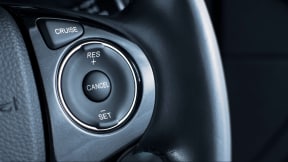Do airbags expire?

Quick insights
- Regular checks, adherence to manufacturer recommendations and prompt action following any warnings or recalls are key for maintaining airbag effectiveness.
- Airbags should be replaced in these situations: after deployment, system malfunction, component aging, recalls and visible damage.
- Airbags are typically covered under new vehicle warranties and may also be included in extended warranties. For repairs outside of warranty coverage, car owners may need to pay for any necessary service or replacement costs.
Airbags are safety devices in vehicles with the sole purpose of protecting passengers in the event of a collision. Airbags work with seat belts to cushion and reduce the impact on your body, helping to prevent serious injuries.
How do airbags work?
When a collision occurs, sensors in the car detect sudden deceleration. The sensors send a signal to the airbag system, which activates a small explosive charge. The charge inflates the airbag with a gas, typically nitrogen, in milliseconds. The inflated airbag forms a cushion between the passenger and the hard surfaces of the car such as the steering wheel or dashboard. The airbag helps to reduce the risk of injury.
How long do airbags last?
The typical lifespan of airbags is usually around 10-15 years. Airbags are designed to last the lifetime of the car, but their effectiveness may vary due to the following factors:
- Design and durability
- Environmental factors (exposure to extreme temperatures or moisture)
- Deployment and replacement
- Maintenance and inspection
- Recalls
Do airbags need to be replaced?
Generally, airbags don’t typically need to be replaced and are intended to last the entire lifespan of the vehicle (10-15 years).
Airbags in new cars
In new vehicles (built since the 2000s), the airbags usually don’t need to be replaced since they are designed to last the life of the vehicle (10-15 years). Below is an overview of how airbags function in newer cars and their significance:
- Advanced airbag systems: New cars are often equipped with a variety of airbags, including front airbags, side airbags, curtain airbags and knee airbags.
- Integration with other safety features: Modern vehicles usually integrate airbags with other safety technologies like electronic stability control and collision avoidance systems to enhance overall passenger safety.
- Maintenance and longevity: Airbags in new cars are made to be durable and effective for the lifespan of the car. Regular maintenance, such as checking for warning lights, can help ensure the airbags remain functional.
Airbags in old cars
Pre-2000 manufacturers recommend replacing airbags. If a driver has an old model, they should refer to their car user manual or speak to a vehicle technician for guidance. Here are some things to consider:
- Technology and design: Older systems might have fewer airbags (i.e., only front airbags) and less sophisticated deployment mechanisms.
- Degradation: Over time, airbag components, such as inflators, can degrade. It’s key to get your airbags checked to ensure the airbag system is still operational.
- Inspection and replacement: For cars that are more than 10-15 years old, it’s recommended to have the airbag system inspected on an annual basis
- Manufacturer's guidance: Older cars may have specific manufacturer guidelines about airbag replacement or maintenance.
Manufacturer recommendations
Although airbag systems typically last for the lifetime of the vehicle, manufacturers may recommend specific intervals for airbag system inspection. Adhering to these recommendations ensures that the airbags are functional and ready in the event of an accident.
Role of professional inspection
A professional inspection is important for assessing the condition and effectiveness of the airbag system. Technicians use specialized diagnostic tools to check the airbag system’s status and ensure all components are working properly.
Potential risks of driving with faulty or expired airbags
Driving with a malfunctioning or expired airbag system can significantly reduce the safety of passengers if an accident were to occur. Airbags are designed to protect drivers and passengers during collisions. A fault system might fail to deploy properly, potentially leading to increased risk of injury. A fault system refers to a diagnostic mechanism that monitors the airbag system for any problems. This system checks to ensure all components are functioning properly.
Do airbags need to be serviced?
Airbags — whether installed within a new or used vehicle — usually do not require routine servicing like other vehicle components, but they do need to be maintained and inspected under certain conditions such as:
- Routine checks: Regularly check for any warning lights related to the airbag system on your dashboard. Follow any specific maintenance guidelines provided by the car manufacturer.
- Post-accident inspection: If the airbags have deployed in a crash, they must be replaced immediately. The entire airbag system should be inspected thoroughly and repaired by a professional to ensure all components are functioning properly.
- Component lifespan: Airbag components such as inflators and sensors may have a finite lifespan. Over time, they can degrade and may need to be replaced based on manufacturer recommendations or after a certain number of years.
- Recall notifications: If there are any recalls affecting the airbag system, it is essential to have the necessary repairs or replacement performed promptly.
Are airbags under warranty?
Yes, airbags are typically covered under the vehicle’s warranty, but the specifics may vary depending on several factors like:
- Coverage duration: When you buy a new car, the airbag system is typically covered under the manufacturer’s new car warranty. This warranty usually lasts for a certain number of years or miles, typically around 3-5 years or 36,000-60,000 miles.
- Extended warranty: If you purchase an extended warranty or service contract, it may offer additional coverage for airbag components beyond the standard new car warranty.
- Recall coverage: If there is a recall affecting the airbag system, repairs or replacements are generally covered by the manufacturer at no cost to the car owner.
- Post-warranty repairs: Once the original warranty expires, any repairs or replacements needed for the airbag system are typically not covered under the car’s warranty. In those cases, the car owner would need to pay for parts and labor out-of-pocket or rely on extended warranties or insurance coverage if applicable.
Additional airbag tips for drivers
Here are a few tips to help ensure that your airbag system functions properly and provides optimal protection in the event of an accident:
- Proper seating position: Sit at least 10 inches from the steering wheel and keep your hands at the 9 and 3 o’clock positions on the wheel to reduce injury risk in a crash.
- Ensure correct airbag operation: Regularly check that the airbag warning light on the dashboard functions correctly and turns off after starting the vehicle.
- Avoid modifications: Do not modify or tamper with your airbag systems because improper handling can compromise their effectiveness.
In conclusion
Airbags are vital for passenger safety. They help protect occupants during collisions by deploying in the event of an accident. Regular maintenance, correct usage and proper seating position are key for ensuring airbag effectiveness. When purchasing a car, prioritize safety features like airbags to enhance overall protection.
For personalized guidance and to make sure your airbag system is functioning properly, seek professional advice from qualified car technicians. Adhering to their recommendations and safety tips can help safeguard you and your passengers while on the road.



